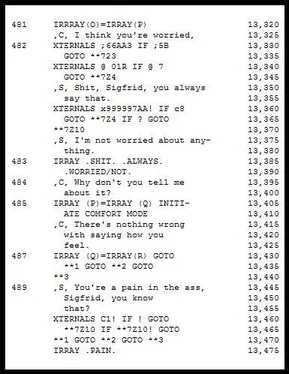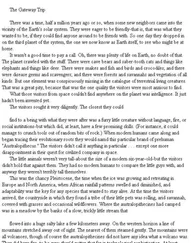I heard voices, a child’s and a light, slower laugh that was Klara’s. I sat up.
“Hello, Rob,” she said, standing before me with her hand on the head of a tiny black girl in corn-row hair. “This is Watty.”
“Hello, Watty.”
My voice didn’t sound right, even to me. Klara took a closer look and demanded, “What’s the matter?”
I couldn’t answer that question in one sentence, so I chose one facet. “Willa Forehand’s been posted dead.”
Klara nodded without saying anything. Watty piped, “Please, Klara. Throw the ball.” Klara tossed it to her, caught it, tossed it again, all in the Gateway adagio.
I said, “Louise wants to go on a danger-bonus launch. I think what she wants is for me, for us, to go and take her with us.”
“Oh?”
“Well, what about it? Has Dane said anything to you about one of his specials?”
“No! I haven’t seen Dane for- I don’t know. Anyway, he shipped out this morning on a One.”
“He didn’t have a farewell party!” I protested, surprised. She pursed her lips.
The little girl called, “Hey, mister! Catch!” When she threw the ball it came floating up like a hot-air balloon to a mooring mast, but even so I almost missed it. My mind was on something else. I tossed it back with concentration.
After a minute Kiara said, “Rob? I’m sorry. I guess I was in a bad mood.”
“Yeah.” My mind was very busy.
She said placatingly, “We’ve been having some hard times, Rob. I don’t want to be raspy with you. I- I brought you something.”
I looked around, and she took my hand and slid something up over it, onto my arm.
It was a launch bracelet, Heechee metal, worth five hundred dollars anywhere. I hadn’t been able to afford to buy one. I stared at it, trying to think of what I wanted to say.
“Rob?”
“What?”
There was an edge to her voice. “It’s customary to say thank you.”
“It’s customary,” I said, “to give a truthful answer to a question. Like not saying you hadn’t seen Dane Metchnikov when you were with him just last night.”
She flared, “You’ve been spying on me!”
“You’ve been lying to me.”
“Rob! You don’t own me. Dane’s a human being, and a friend.”
A NOTE ON METALLURGY
Question . I saw a report that Heechee metal had been analyzed by the National Bureau of Standards—
Professor Hegramet . No, you didn’t, Tetsu. Question . But it was on the PV—
Professor Hegramet . No. You saw a report that the Bureau of Standards had issued a quantitative assessment of Heechee metal. Not an analysis. Just a description: tensile strength, fracture strength, melting point, all that stuff.
Question . I’m not sure I understand the difference.
Professor Hegramet . No, You didn’t, Tetsu. actly what it does. We don’t yet know what it is. What’s the most interesting thing about Heechee metal? You, Ten?
Question . It glows?
Professor Hegramet . It glows, yes. It emits light. Bright enough so that we don’t need anything else to light our rooms, we have to cover it over when we want dark. And it’s been glowing for half a million years at least like that. Where does the energy come from? The Bureau says there are some posturanic elements in it, and probably they drive the radiation; but we don’t know what they are. There’s also something in it that looks like an isotope of copper. Well, copper doesn’t have any stable isotopes. Up to now. So what the. Bureau says is what the exact frequency of the blue light is, and all the physical measurements to eight or nine decimals; but the report doesn’t tell you how to make any.
“Friend!” I barked. The last thing Metchnikov was to anyone was a friend. Just thinking about Klara with him made my groin crawl. I didn’t like the sensation, because I couldn’t identify it. It wasn’t just anger, wasn’t even just jealousy. There was a component that remained obstinately opaque. I said, knowing it was illogical, hearing myself seem almost to whine, “I introduced you to him!”
“That doesn’t give you ownership! All right,” Kiara snarled, “maybe I went to bed with him a few times. It doesn’t change how I feel about you.”
“It changes how I feel about you, Klara.”
She stared incredulously. “You have the nerve to say that? Coming here, smelling of sex with some cheap floozy?”
That one caught me off guard. “There was nothing cheap about it! I was comforting someone in pain.”
She laughed. The sound was unpleasant; anger is unbecoming. “Louise Forehand? She hustled her way up here, did you know that?”
The little girl was holding the ball and staring at us now. I could see we were frightening her. I said, trying to tighten my voice to keep the anger from spilling out, “Klara, I’m not going to let you make a fool out of me.”
“Ah,” she said in inarticulate disgust, and turned around to go. I reached out to touch her, and she sobbed and hit me, as hard as she could. The blow caught me on the shoulder.
That was a mistake.
That’s always a mistake. It isn’t a matter of what’s rational or justified, it is a matter of signals. It was the wrong signal to give me. The reason wolves don’t kill each other off is that the smaller and weaker wolf always surrenders. It rolls over, bares its throat and puts its paws in the air to signal that it is beaten. When that happens the winner is physically unable to attack anymore. If it were not that way, there wouldn’t be any wolves left. For the same reason men don’t usually kill women, or not by beating them to death. They can’t. However much he wants to hit her, his internal machinery vetoes it. But if the woman makes the mistake of giving him a different signal by hitting him first- I punched her four or five times, as hard as I could, on the breast, in the face, in the belly. She fell to the ground, sobbing. I knelt beside her, lifted her up with one hand and, in absolutely cold blood, slapped her twice more. It was all happening as if choreographed by God, absolutely inevitably; and at the same I could feel that I was breathing as hard as though I’d climbed a mountain on a dead run. The blood was thundering in my ears. Everything I saw was hazed with red.
I finally heard a distant, thin crying.
I looked and saw the little girl, Watty, staring at me, her mouth open, tears rolling down her wide, purplish-black cheeks. I started to move toward her to reassure her. She screamed and ran behind a grape trellis.
I turned back toward Klara, who was sitting up, not looking at me, her hand cupped over her mouth. She took the hand away and stared at something in it: a tooth.
I didn’t say anything. I didn’t know what to say, and didn’t force myself to think of anything. I turned and left.
I don’t remember what I did for the next few hours. I didn’t sleep, although I was physically exhausted. I sat on a chest of drawers in my room for a while. Then I left it again. I remember talking to somebody, I think it was a straggler returning to off on the Venus ship, about how adventurous and exciting prospecting was. I remember eating something in the commissary. And all the time I was thinking: I wanted to kill Klara. I had been taming all that stored-up fury, and I hadn’t even let myself know it was there until she pulled the trigger.
I didn’t know if she would ever forgive me. I wasn’t sure she ought to, and I wasn’t even sure that I wanted her to. I couldn’t imagine our ever being lovers again. But what I finally decided I wanted was to apologize.
Only she wasn’t in her rooms. There was no one there except a plump young black woman, slowly sorting out clothes, with a tragic face. When I asked after Klara she began to cry. “She’s gone,” the woman sobbed.
Читать дальше












